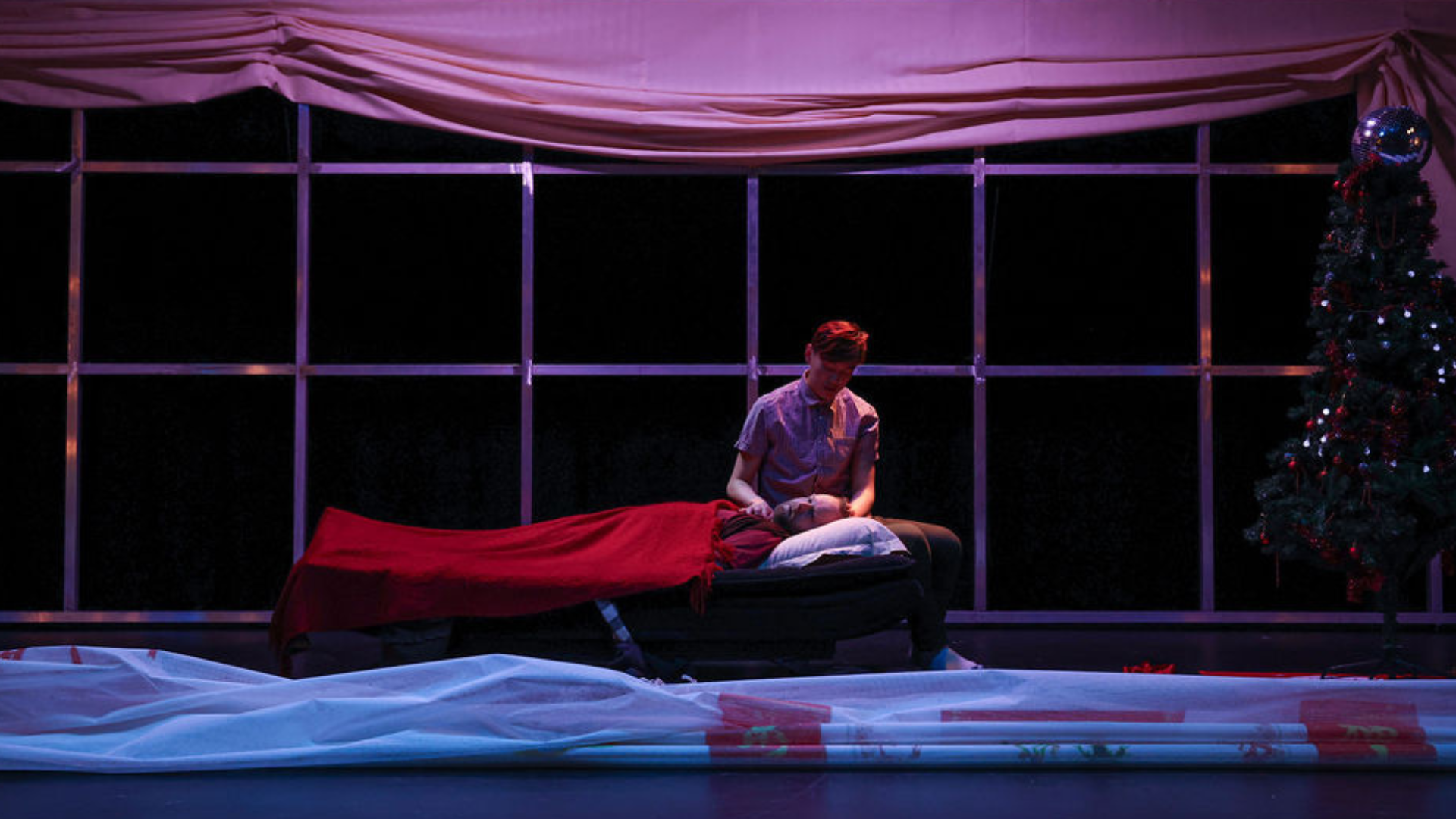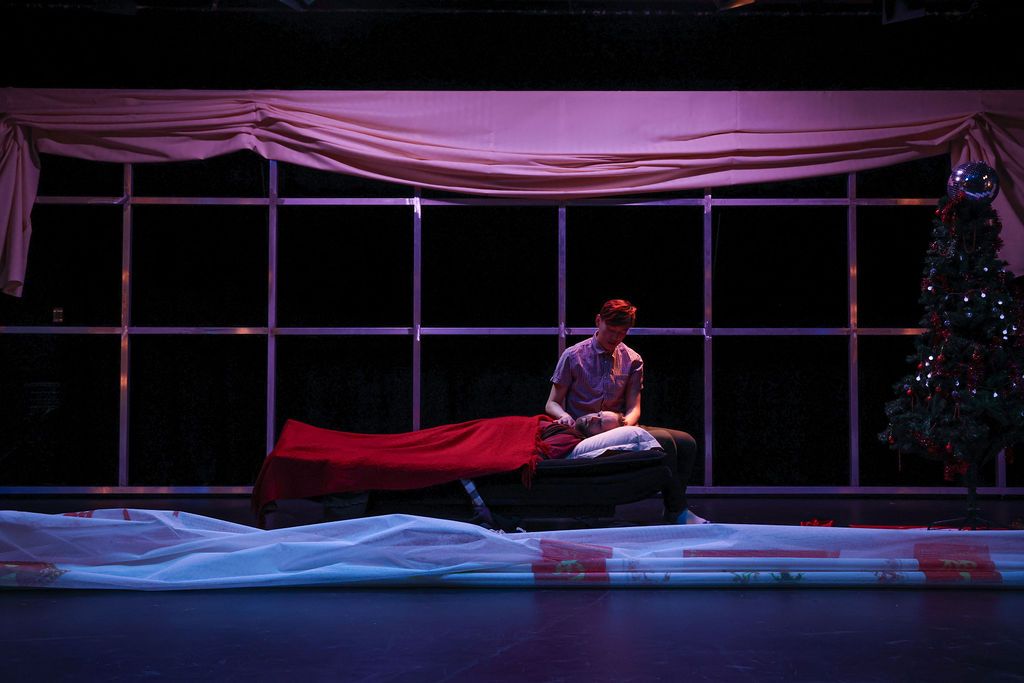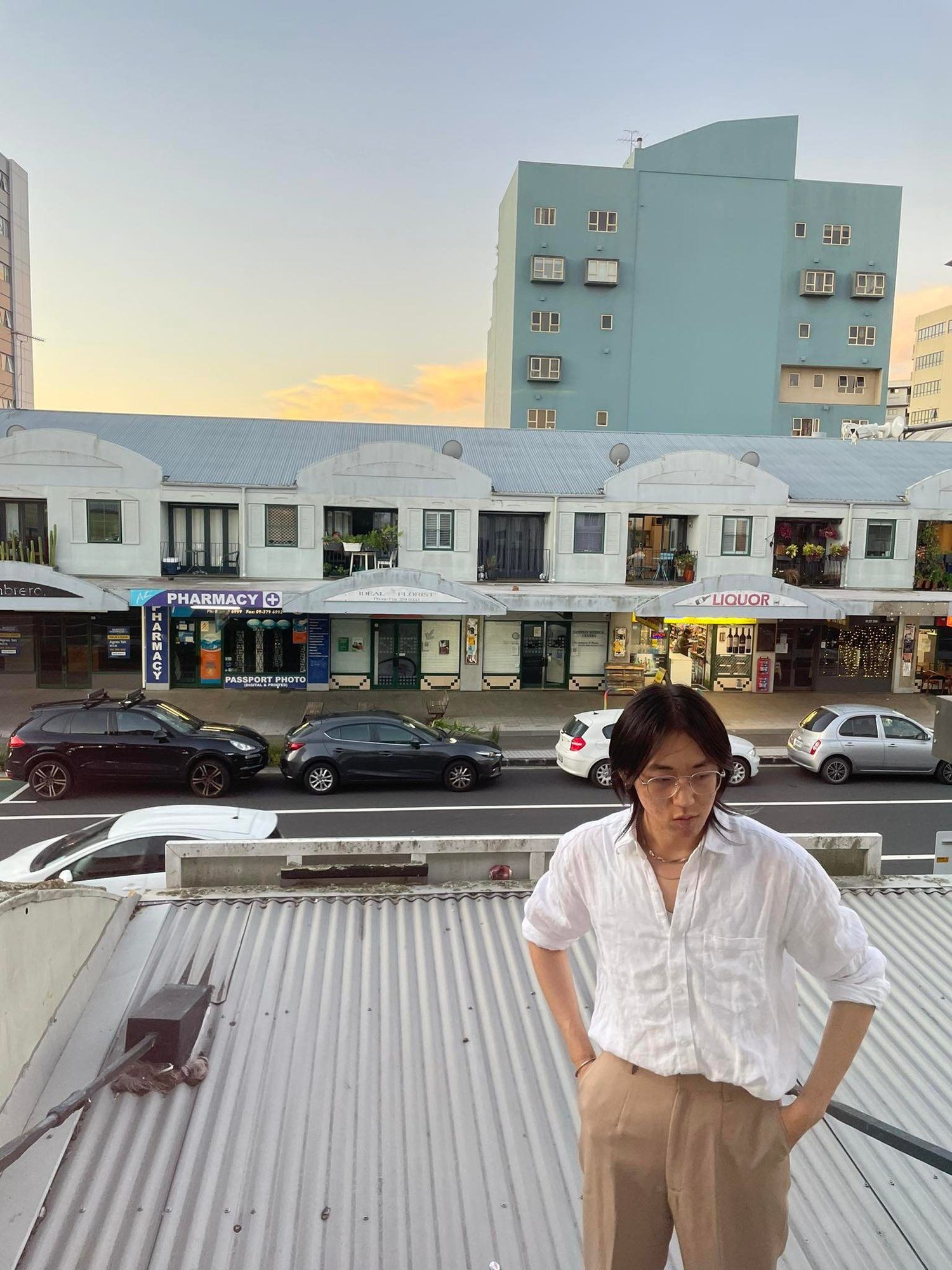Review: Losing Face
Ding, dong, it’s a father–daughter reunion on Christmas Eve stuck on repeat. Arela Jiang unpacks the unconventional Queer Asian family drama of Nathan Joe’s Losing Face.
It could have been easy to dismiss Losing Face as just another work of a Queer Asian using theatre as therapy to air their grief of being Queer and Asian. But do so at your own peril, because Nathan Joe’s newest play is a slice of family dysfunction on a china plate.
Losing Face is a play about a Christmas Eve that never ends; a looping series of failed reconciliations between a white man, Mark (Andrew Ford), and his estranged Chinese-white daughter, Jennifer (Shervonne Grierson). Much to Jennifer’s dismay, Mark is dating Shawn (Danny Lam) – a Chinese man closer to Jennifer’s age than Mark’s with a naivety to match. From the get-go, it is clear that all is not calm and all is not bright with this particular Christmas homecoming. Mark anxiously sets up his home for Jennifer’s imminent arrival, followed by a minor tiff with Shawn that ends with sex. Of course, he misses picking up Jennifer from the airport. And as the resets of the father–daughter reunion begin, we see the depth of their dysfunction.
In Losing Face, we get to re-examine and reimagine the idea of ‘reconciliation’ as it is played out over 27 increasingly absurd loops. Mark and Jennifer’s reunions are littered with emotional landmines from the mess of daddy issues their relationship dredges up. When they are set off by insensitive comments or uncontrollable honesty, a chime sounds and the scene loops for a more sanitised version to take its place. Their attempts at reconciliation become increasingly surreal, including (but far from limited to) disco monologues, polygraph tests and perverse sexual fantasies. We see the two try again and again – never quite getting it right but still refusing to let each other go.
Mark and Jennifer’s reunions are littered with emotional landmines from the mess of daddy issues their relationship dredges up.
This is a play that toys with second chances. The play’s Groundhog Day premise means it doesn’t tread the worn-out path of neatly tied-up resolutions; you’re not given a simple, satisfying conclusion invoking the warm family fuzzies. In a pre-show Zoom interview, Joe explains his desire to disrupt the format of the conventional domestic drama, because this is far from the conventional family. “It loops back and forth trying to reconcile itself. I think that’s very much the Queer sort of utopia in which there are spaces that give us permission to think about potential and possibility and alternate paths.”
I found this mechanism much more compelling in capturing the emotional messiness in flawed family dynamics than if the narrative had been a typical linear family drama. I found myself reflecting on the rifts in my own fraught filial relationships and the roads not taken to mend them – an experience many in the audience shared, I’m sure. Be prepared to confront every botched family moment you wish you could take back.
Danny Lam as Shawn, sits looking over Andrew Ford as Mark, who is lying in bed. Photography: Amanda Billing
At its core, Losing Face is about family: how we fuck it up and what we must give and take to make it right. There are universal questions about parent–child reconciliation that speak to anyone whose familial links fray at the edges. However, it’s in the work’s exploration of shame in Jennifer and Mark’s dynamic that this story resonates strongly with its Chinese and Queer audiences. With a title like Losing Face, how could we not explore filial piety and the crushing weight of intergenerational obligation?
With a title like Losing Face, how could we not explore filial piety and the crushing weight of intergenerational obligation?
In classic Nathan Joe fashion, the script is flipped, and the child is the one who shames the parent for failing to meet their expectations. We see Jennifer put Mark on trial again and again for failing to be the dad she wanted: faithful, culturally competent – “one of the good ones.” One loop sees Jennifer slam Mark for finally having the time (read: motivation) to learn Chinese despite never having done so for her, depriving her of a culturally connected childhood. I’ll admit, I’ve felt the resentments Jennifer was dredging up; they stirred up a whole lot of discomfort over my own cultural decay. Seeing my own disappointments in my immigrant parents for buying into assimilation was a sucker-punch moment – it brought up so many conflicting feelings of vindication, wistfulness and guilt. I couldn’t help but marvel at Joe’s writing for being able to excavate the diasporic child’s unmet expectations with such painful specificity. “The parent–child relationship is usually the parent shaming the child rather than that child shaming the parent,” Joe explains, “but these relationships can be so interchangeable; I wanted to tackle that.”
The play subverts the typical parent–child relationship narrative to tell a story about reconciliation by imagining outside the ‘typical’ Asian family context. For Joe, the ways in which a biracial family grapples with shame was one of the working questions he had when creating Losing Face. “I was wondering, is it a helpful thing or harmful thing? ... With this reconciliation story between parent and child, there is also a wrestling with [Jennifer] being not fully white and not fully Asian in the space.” And you can clearly feel these considerations embedded in its foundation to deliver some of the play’s hardest-hitting moments. In one reset, Jennifer rejects Mark, and her own white heritage by extension, delivering a blistering monologue in Cantonese. “She’s going to live half a person, a half-formed thing,” Shawn translates into English on stage, “rather than live a whole thing if it means you are inside her. … she is going to begin, begin with the tumour of her father tongue.” Jennifer’s words are pure venom, born from her own shame and shame on her father for making her this way. There is the sense of Grierson’s lived experience that elevates these moments. In a rehearsal for the show, Grierson shares her own reflections on the reconciliation of culture and shame as someone who is mixed race, particularly around language. “Even though I can understand it, it feels weird speaking Cantonese,” she says, “I get self-conscious speaking the mother tongue in front of ‘native speakers’ – there’s some embarrassment there in not being fluent and having a New Zealand accent.”
Seeing my own disappointments in my immigrant parents for buying into assimilation was a sucker-punch moment – it brought up so many conflicting feelings of vindication, wistfulness and guilt.
From the show’s premise, you’re set up to write Mark off as the worst of white gays, and to pity Jennifer and Shawn as his victims. But rather than reduce its characters to clichés, Losing Face demonstrates an admirable refusal to buy into them. The play doesn’t let Mark get away with pulling the classic gay man’s get-out-of-jail-free card of “I’m doing my best to live my truth”; Jennifer holds him accountable by reminding him of the real hurt and burden his “truth” caused. But nor is Jennifer the hero of the story. Her righteous cause as the neglected daughter leads her to push Mark too far, and the obvious pain this causes her father subverts our expectations of sympathy. And Shawn, though appearing as the naïve, Asian twink duped by another sub-par white man, isn’t just a backseat passenger in his relationship. He sees it for what it is, and is firm in his love for Mark anyway.
There’s something empowering about seeing the agency of these characters portrayed honestly. Too often we see the disempowerment of Asian characters as demure, sexualised objects serving the white male gaze. And our media is overpopulated with poorly behaved Queer characters whose trauma means they can do no wrong. With Losing Face, we get characters who are complicated and messy. They are agents in their own destruction who make mistakes, hurt each other, and choose to love painfully rather than painlessly. They also heal, learn to be better, and try to do the right thing. Even when time and space are bending around them, these characters are not passive objects but active participants in their own stories. Seeing them use their autonomy to navigate their flawed and fucked-up lives helps us to challenge how we could navigate our own.
Too often we see the disempowerment of Asian characters as demure, sexualised objects serving the white male gaze.
It’s a real credit to Joe’s dedication in telling a human story with enough nuance so it never seems like the audience is being led to feel any particular way about the characters or their relationships. As Joe puts it, “I want the characters to judge each other, but I don't want to judge them too much. I want to be able to love them. And I want to be able to understand them and all the complexity.” And it’s the fullness of Ford, Grierson and Lam’s emotional range that allows the play to pull that off. Their performances balance charisma and vulnerability with a subtlety that allows for their characters to be gloriously messy.
Shervonne Grierson as Jennifer. Photography: Amanda Billing
Losing Face isn’t a total scrooge of a play, though – rest assured, it’s still as silly and sexual as any of Nathan Joe’s other works. There are enough sexual innuendos as well as actual scenes to ruin every single Pornhub category for you, and certain resets alone are so shockingly absurd you can’t help but crack up. His writing is sharp and so is his comedic timing – I mean, who else is out here making up complaint-to-the-Human-Rights-Commission-level jokes that gag the audience? It’s in these resets where reality plays fast and loose that the audience gets to breathe and enjoy a brief reprieve from the emotional whirlwind we’ve just been swept through.
Losing Face leaves us with questions and gives no easy answers: Were the repeats memories? Realities? Do they remember? Do they want to remember? “I want the play to be complicated enough that it doesn’t have any concrete answers,” Joe explains. Instead, he asks hard questions with no easy answers, like: “Should that relationship get better? Should this man be forgiven? Is she being too harsh? By the end, we are given one last repeat of Mark and Jennifer, father and daughter, reuniting. We are left hoping they do remember everything, that this time things will finally turn out right. All we know is that they will try again – and maybe that’s enough.



